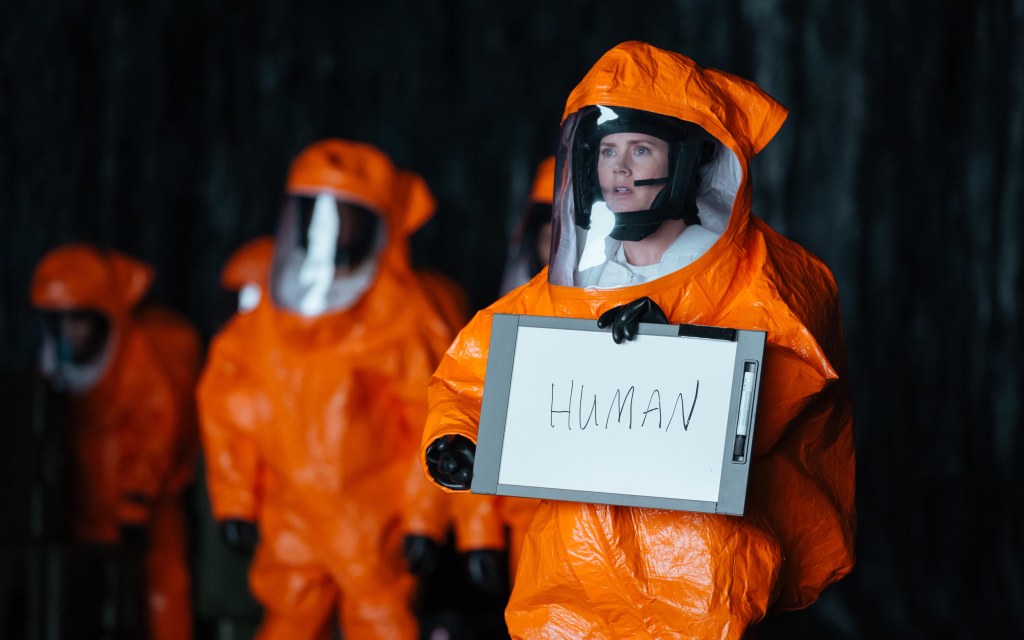
Without a shadow of a doubt, this is my film of 2016.
“If you could see your whole life laid out in front of you, would you change things?” – Dr. Louise Banks
Do you know what makes Arrival a beautiful film to watch? Its simplicity. The simplicity in its concept, direction and execution which may feel familiar but is completely different from what you normally see. Arrival takes something so grand and far-reaching and yet speaks volumes on how we view the world today. Its ultimate message so clear and precise, it’s how we take that on board to shape our future.
Arrival is an unconventional sci-fi film. Why unconventional? Well imagine a typical alien invasion movie. Hollywood as of late whether it’s Independence Day (both original and its sequel), Battle Los Angeles, any of the Transformers films or Skyline for example, have always relied on spectacle. We want to be dazzled and amazed both visually and technically. We watch as aliens showcase their full destructive power whether we’re viewing it on an IMAX screen or in the comforts of our own homes. “They always get the landmarks” – a line which Independence Day: Resurgence boasts as our capital cities are given an extensive remodelling job. In our popcorn heaven delight, we witness mankind fight back with all our military muscle as we lose ourselves in our guilty pleasure fantasies. It’s not to say there’s anything wrong with those films (with exception of Transformers because THEY ARE ALL BAD), but those films miss a vital ingredient that makes an impact and connection with the audience – heart and purpose.
The real beauty of an alien invasion film (when done properly) is not the aliens themselves or their power. They are merely antagonists bringing to light the choices humanity must face. How do we react? How do we co-exist or fight back? What would you do? This aspect becomes a sacrificial neglect for films which rely solely on the visual spectacle. It means we don’t get involved in the predicaments characters face and they’re missing a trick. It is our connection with human nature that allows us to follow characters as they face those enticing yet explorative questions. It’s why a certain number of sci-fi films become more than just films. They shed their cult status tag or initially poor and misguided reviews. They evolve into a new creation. They become iconic. They become endearing. They become legendary.
Arrival certainly belongs in that crowd and caps off what has been a phenomenal return of brilliant yet thought-provoking sci-fi films back on our screens.

So how does Arrival set itself apart? Well first of all, it doesn’t follow the traditional method and response of what typical alien invasion films fall into. It doesn’t respond with a shoot first, ask later mantra. It doesn’t respond with an alien threat to wipe out humanity and our natural resources like a boot stepping on a colony of ants. Arrival merely wants to understand what first contact would be like. It presents it as an unnerving and uncomfortable experience, thanks to the brilliant soundtrack by Jóhann Jóhannsson.
Arrival debunks and removes one assumption that some invasion films have – how aliens communicate with the human race. Obviously it’s not intentional but most alien invasion films make an arrogant assumption that aliens speak English or certainly understand Earth language.
Why are they here? What is their purpose? Where are they from? When dealing with an unknown threat and entity, these are important questions that immediately come to mind. But in order to get to that point, we need to understand them. Arrival intelligently de-constructs the concept of language, breaking it down and simplifying it. Like how parents would teach children words, communicative language is re-structured and re-purposed into something tangible. By doing this, it breaks down barriers by promoting a trade-off between the species.
How refreshing!
Agent Halpern: “We have to consider the idea that our visitors are prodding us to fight among ourselves until only one faction prevails.”
Dr. Louise Banks: “There’s no evidence of that.”
Agent Halpern: “Sure there is. Just grab a history book. The British with India, the German with Rwanda.”
Director Denis Villeneuve gets the emotional balance right. Where there’s fascination, there’s confusion. Where there’s curiosity, there’s the unknown. Where there’s possibility, there’s anarchy. The film presents this momentous event as a contemplation that we’re not alone in the universe. A higher power exists and it’s a daunting prospect. Taking a page out of 2001: A Space Odyssey, the ships are strange yet monolithic in design, appearing mysteriously all over the globe in locations that won’t distract you. Just like 2001, we could be on the cusp of greater intelligence or the next phase of evolution.
It’s the fear of what we don’t understand that drives Arrival.
We see the contrasting effects on how people respond to the event. Some are calm and rational like Dr. Louise Banks (played by the brilliant Amy Adams) and Ian Donnelly (Jeremy Renner). They take a logical approach using their background knowledge of linguistics and physics to analyse the ever-changing situation. Others take a self-destructive path – there’s panic on the streets, looting and finger-pointing, upholding and justifying the blame culture. We’ve become obsessed and gripped by 24 hour news networks trying to determine any bit of factual nugget that we can reassure our existence by. In a battle of self-preservation, we use what we know. We respond by force as a method of expression and Louise and Ian have to battle against those with trigger happy urges in order to understand the true purpose of the aliens.

But here’s the best part about Arrival. It conveys something deeper than a simple alien invasion tale. It uses a religious allegory to cement its core theme and idea – the story of Babylon.
Ironically, the story of Babylon was used in a recent X-Files episode (titled Babylon) and while Chris Carter’s intent was there, the execution was sadly rushed. Arrival gets a better handle on the subject.
It’s the idea on how languages were born in the first place. As described in the book of Genesis, “everyone on Earth spoke the same language” and yet the human race was punished for building a structure that could be “tall enough to reach Heaven”. God, angered by this act then scattered humans all over the world. As a final task, God removed our ability to understand each other.
The story of Babylon and the Tower of Babel seems so relevant. Arrival takes the great effort to demonstrate how communication can be a simple way of engaging with others. To rebuild or establish relationships and to view a different opinion. What Dr. Louise Banks showcases is empathy and understanding to accomplish her goal. Yet as she goes through struggles (both professionally and personally), it’s evidently clear as to why the path is not easy.
Our planet has become Babylon. Everyone is talking and yet there’s not enough listening. We’ve seen it all around us in 2016 in our political debates and our media. Whether it’s Brexit or the US Presidential Election, an insensitive ugliness has emerged. Our necessity to put our point across whether its true or not (because no one seems to fact check anything any more), outweighs what others are saying. Whoever shouts the loudest is given a bigger platform to dominate over sense and reason. All this helps to spread fear and misunderstanding and Arrival makes that point known very clearly. Military soldiers decide to take action into their own hands against the needs of the scientists. Global nations react like dominoes over the political repercussions on the alien discovery.
It’s a scary world we live in and you wonder to yourself who’s the biggest threat – the aliens or ourselves?
That’s why characters like Louise Banks is so important from a narrative perspective. Even during the darkest moments of the film, she still manages to find hope through the questionable madness. There is a simple purpose that we could all learn from. We need to find a common language again. In Close Encounters of the Third Kind, it was the iconic five tone notes that brought people together. The common language was music. But whatever our common, universal language is, it is only then that humanity could have a chance to progress, move forward, unite and evolve. Arrival introduces that concept with a very clever twist which goes beyond any realms of predictability.
Arrival is only let down by its ending, sadly the weakest part of the film. The last few lines of the film was not needed. Visually Arrival is a fantastic and beautifully looking film, thanks to the work of cinematographer, Bradford Young. The film spoon-feeds you the answer when it was evidently clear what was happening. Secondly, Arrival is wrapped up like a neat bow to conclude things. It does leaves some mystery for you to take away but in terms of resolution of the characters, the film didn’t need to be a closed book.
But in all honesty, they were trivial. As I’ve learnt from watching a great deal of sci-fi films, to summarise is always the hardest thing to do. Films like this gets a pass because you ultimately remember the journey and film’s intent rather than the conclusion.
Arrival showcases the best performance you’ll see by Amy Adams. Her poise and nuance is perfect to counter-balance an obvious male-dominated arena.
But Arrival also showcases that by working together in a collaborative manner can show the possibilities humanity can achieve. Not in the Tower of Babel circumstances but certainly better versions of ourselves.
Maybe that is something we can all strive for and that’s what makes Arrival outstanding.
But let’s take comfort that humanity didn’t release a white dove into the sky like Mars Attacks. We all know how Earth ended up…






Don’t Be Shy – Leave a Reply